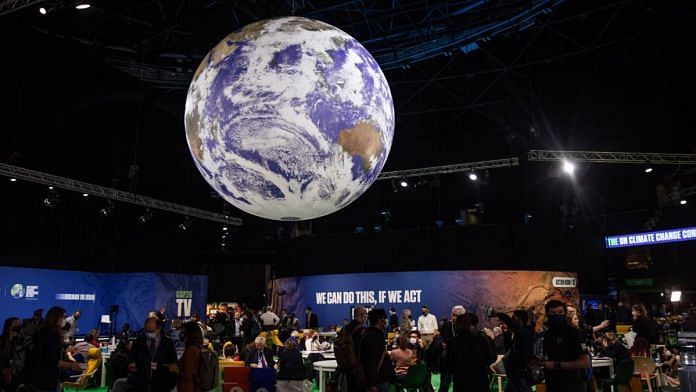New Delhi: Negotiations at the COP26 on how to keep global warming “well below” 2 degrees Celsius have led to deep divisions between developed and developing countries, with the latter group (which includes India) saying that the talks will be a “failure” if climate finance by the former isn’t guaranteed.
The countries were speaking at the informal stock-taking held by the COP26 presidency, to air their views on how negotiations were proceeding one week after they had started.
Lead negotiator Richa Sharma, representing India on behalf of BASIC (Brazil, South Africa, India and China), said in a statement that India “would like to warn that lack of a serious approach to climate finance will jeopardize the enhanced mitigation and adaptation ambition as well as net zero pledges of parties.”
India last week declared it would reach net zero emissions by 2070. It also said developed countries should make available funds to the tune of $1 trillion alongside making these commitments.
Statements by the G77 and China, Like Minded Developing Countries (LDMC), and BASIC — all of which include India and more than 100 other countries — revealed that they were running out of time to negotiate key rules under the Paris Agreement, including those pertaining to climate finance, and said developed countries were “not interested” in negotiating in good faith.
“Glasgow is not the starting point of climate action for us, as is being portrayed. We come from Paris, Rio, Stockholm—let us not forget that. There is a history of broken promises and unfulfilled commitments by the developed countries, which has a very strong bearing on where we are at today in terms of temperature increase and its impacts,” said Bolivia’s Diego Pacheco, representing the LMDC.
Guinea’s lead negotiator Ahmadou Sebory Touré, on behalf of the G77 and China, said, “A COP without clarity on finance or an outcome of only empty or insufficient announcements that will create debt for developing countries can never be a successful one.”
Also read: India will reach net-zero emissions by 2070, PM Modi says at COP26 as he promises ‘panchamrit’
New goal on climate finance
The biggest bone of contention lies in drafting the new collective quantified goal for climate finance, under the Paris Agreement, for long-term climate finance.
In 2009, developed countries pledged to deliver $100 billion in climate finance every year from 2020, which was later extended to 2025, to support developing countries in reducing emissions. However, they have failed to achieve this goal, and have admitted that they are unlikely to do so before 2023.
Parties are now mulling over the rules that should govern the new collective quantified goal under the Paris Agreement, which will follow the years after 2025, after the commitment period for the $100 billion lapses.
The Africa Group, representing 54 countries, said the new finance goal should begin with a commitment of at least $1.3 trillion, in a grant basis form “of which 50 per cent is for mitigation and 50 per cent is for adaptation.”
Climate mitigation means preventing severe impacts of climate change by reducing emissions, while climate adaptation refers to the process of adjusting to the current and future effects of climate change.
Guinea, in its statement, said that developed countries were obstructing a proposal in favour of an ad hoc committee which would oversee the implementation of this new goal, to make sure they are fulfilling their commitments.
The LDMC agreed, saying “Our partners want a procedural decision on the new collective quantified goal on climate finance. They don’t want to define climate finance. They don’t want a separate decision on the global goal of climate adaptation.
“They don’t want to talk about loss and damage needs for developing countries. How can real ambition be achieved with such an approach?”
Also read: What is the ‘Global Methane Pledge’ that 103 countries signed at COP26
Other issues
Parties also complained of lack of access to the venue and clashing schedules leading to a lack of representation through key negotiations.
“No less than four negotiation sessions began with the Alliance of Small Island States not in the room because three agenda items, for which we have one coordinator, were happening in parallel. In one case our coordinator was stuck outside because the room was at capacity. That coordinator represents 39 parties in this process,” said Lia Nicholson of Antigua & Barbuda, representing the Alliance.
“On the agenda item on national adaptation plans, the conflicting time scheduled for adaptation related agenda items adversely affected the progress of work on national adaptation at these Subsidiary Body sessions,” Guinea added.
India’s stance
On behalf of BASIC, India said it aligned with the G77 and China, and demanded a working, operationalised definition of climate finance, which developed countries are opposing.
“It has been over a decade since the annual USD 100 billion pledge, and the world is still waiting for its mobilization and delivery,” said Sharma, adding that developing nations were trying to “re-negotiate” aspects of the Paris Agreement that had already been settled, saying “trust in multilateralism and credibility of the process is at stake.”
“We can shift focus to implementation if we stop renegotiating elements of Paris Agreement, such as who bears responsibility for providing resources, or how frequently parties need to review their Nationally Determined Contributions. These are settled issues under the Paris Agreement,” Sharma said.
(Edited by Neha Mahajan)
Also read: COP26 is not just about India’s commitment to climate change. It’s also a message to the US



